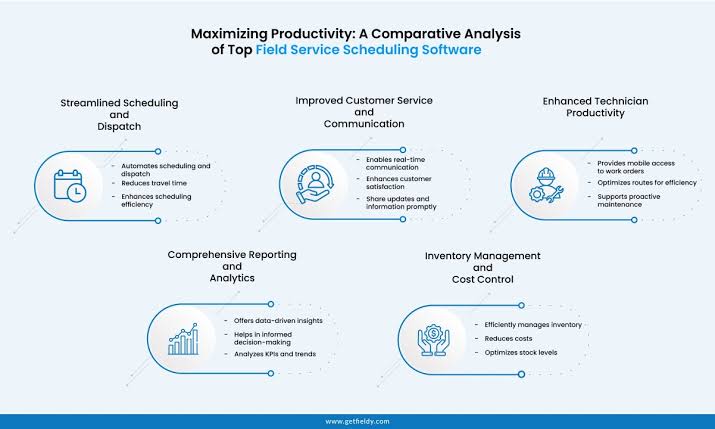Field service scheduling is a critical component for businesses that rely on service teams to meet customer needs. Efficient scheduling not only optimizes resource allocation but also enhances customer satisfaction by ensuring timely service delivery. As competition increases, companies are seeking ways to improve their operational efficiency through effective scheduling strategies.
Many organizations face challenges in managing their field service operations, such as unexpected delays and miscommunication. Technology plays a pivotal role in addressing these issues by providing tools that streamline scheduling processes and improve real-time communication among team members. This results in reduced downtime and maximized productivity for field service technicians.
Understanding the key elements of successful field service scheduling can provide significant advantages in this dynamic environment. By adopting best practices and innovative solutions, businesses can enhance their service delivery and maintain a competitive edge.
Fundamentals of Field Service Scheduling
Field service scheduling is critical for maintaining operational efficiency. It encompasses the strategic organization of resources such as personnel, equipment, and timetables to enhance service delivery.
Defining Field Service Management
Field service management (FSM) involves coordinating the resources needed to provide services at customer locations. This includes scheduling technicians, managing inventory, and tracking service requests.
Key elements of FSM include:
- Work Order Management: Assigning tasks based on priorities.
- Resource Allocation: Ensuring the right technician with the necessary skills is assigned to each job.
- Mobile Solutions: Utilizing apps that allow technicians to receive information and updates in real time.
By effectively managing these components, businesses can ensure timely service and increased customer satisfaction.
Importance of Efficient Scheduling
Efficient scheduling in field service leads to significant operational benefits. It directly affects response times, customer satisfaction, and cost management.
Benefits include:
- Increased Productivity: Technicians can complete more jobs per day when schedules are optimized.
- Improved Customer Experience: Timely services foster trust and loyalty among customers.
- Cost Reduction: Optimized routes lower travel expenses and reduce idle time.
Efficient scheduling can also lead to higher employee morale, as it minimizes stress associated with last-minute changes or miscommunications.
Challenges in Field Service Scheduling
Field service scheduling faces various challenges that can hinder operational efficiency.
Common issues include:
- Dynamic Work Environments: Unexpected delays from traffic, equipment failures, or emergency service requests require quick adjustments.
- Resource Limitations: Limited availability of skilled technicians can lead to scheduling conflicts.
- Data Accuracy: Outdated or incorrect information can cause suboptimal scheduling decisions.
These challenges necessitate robust scheduling tools and real-time communication to enhance responsiveness and adaptability in field service operations.
Advanced Scheduling Strategies
Implementing advanced scheduling strategies enhances efficiency and customer satisfaction in field service operations. By using technology effectively and focusing on workforce management, organizations can optimize their scheduling processes.
Leveraging Technology for Dynamic Scheduling
Dynamic scheduling utilizes software solutions to create flexible schedules that adapt to real-time changes. Field service management software can integrate with GPS and communication tools, allowing for immediate updates based on traffic conditions or job completion times.
Key features include:
- Automated Rescheduling: Automatically adjusts schedules as jobs are completed or delayed.
- Mobile Access: Technicians can receive updates and communicate any changes from the field.
- Predictive Analytics: Analyzes data to forecast demand and optimal scheduling patterns.
By leveraging these technologies, companies can significantly reduce downtime and improve service response times.
Workforce Management and Capacity Planning
Effective workforce management revolves around understanding workforce capabilities and business needs. Proper capacity planning ensures that the right number of technicians with the appropriate skills are available when required.
Strategies to consider:
- Skill-Based Scheduling: Assign jobs based on technician skills to maximize efficiency.
- Forecasting Demand: Utilize historical data to anticipate peak service periods, allowing for adequate staffing.
- Employee Training: Investing in training helps maintain a knowledgeable workforce ready for diverse tasks.
These strategies not only improve service quality but also help minimize operational costs.
Performance Metrics and Analysis
Performance metrics play a crucial role in measuring the effectiveness of scheduling strategies. Regular analysis of these metrics allows organizations to identify areas for improvement.
Important metrics to track include:
- First Visit Resolution Rate (FVRR): Measures how often issues are resolved on the first visit.
- Average Response Time: Indicates the speed at which services are initiated following a customer request.
- Technician Utilization Rate: Reflects the percentage of time technicians spend on productive tasks versus idle time.
By focusing on these metrics, organizations can make informed adjustments to their scheduling practices, leading to better resource allocation and enhanced service delivery.



